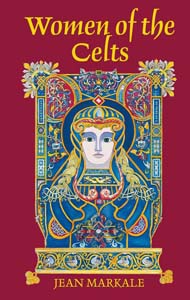Women of the Celts
Jean Markale
Published by Inner Traditions, 1975
Within our society's patriarchal framework, the goddesses of the distant past have
been obscured and buried. But they do still exist and sometimes rise triumphantly
to rock the supposedly immovable foundation of masculine society.
The Celts, who at one time occupied the whole of Europe, were a people who
stood halfway between earlier matriachal societies and the later patriarchal
Indo-European cultures. Their laws and customs reveal an equality and harmony
between men and women that is unique. Celtic women enjoyed, among other
things, equal ownership of property with men and widespread sexual freedom.
In an even deeper way, the Celtic myths show an extraordinary understanding
of woman in relation to all of life. It is these myths and legends that author Jean
Markale illuminates in exquisite detail, revealing the myriad faces of woman, from
prophetess and enchantress to warrior and educator. For the Celts, the quest for
the Holy Grail becomes a search for love and for the paradise that is concealed, but
ever alive, in the depths of the unconsious. In this hidden realm, woman wears
the mask of man's initiator, transformer, and deliverer. Within the maternal womb
of the grail man is given new birth and new life.
This new life does not come easily to man. In all her mythic guises - the
Lady of the Night, the Rebellious Daughter, the Queen of Beginnings - woman
is a powerful force, born of freedom and responsibility. The path to her temple
of knowledge, wealth, and power is often forbidding. Reaching her is a magical
act accomplished by a man who loves, who has overcome his repugnance, and is
resigned to annihilation in order to win all. This is the new man who emerges in
Celtic myth and legend.
"Until now," the author writes, "only poets have really understood woman.
This is probably because woman, like poetry, is a continuous creation, a crucible
in which scattered energies are melted down, and which embraces the unique act
that revolves all contradictions, abolishes time, breaks the chains of loneliness, and
leads back to a lost unity. What mystery surrounds this strange character!"
In Women of the Celts, Markale takes us deep into a mythical world where both
man and woman become whole by realizing the feminine principle in its entirety.
(The text above comes from the back of the book)


